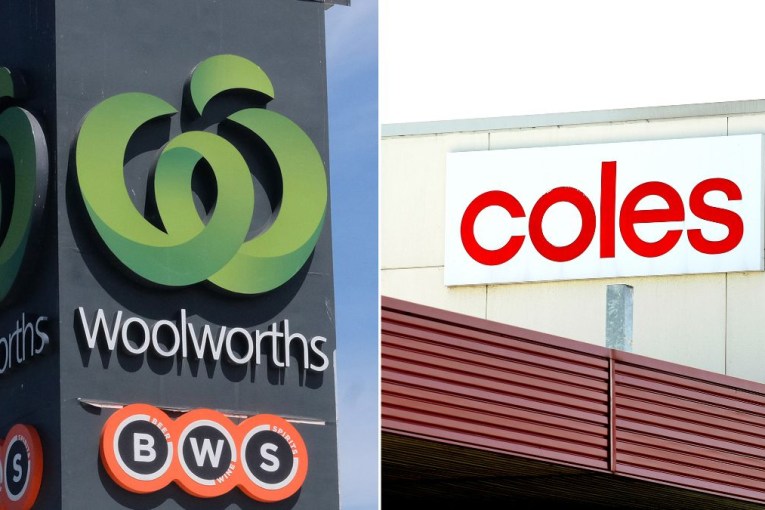Shoppers see red as Coles and Woolworths’ recycling partner just stashes bags

Shoppers have been left “sad, angry and frustrated” after it was revealed hundreds of millions of plastic items were not being recycled as intended by an Australian company.
On Tuesday, the Sydney Morning Herald reported that the company charged with recycling plastic items like shopping bags, chip packets, cling film and bread bags had secretly stored the plastic in warehouses.
Melbourne-based company REDcycle partnered with Coles and Woolworths, collecting plastic items from drop-off points around the country.
The company recycles plastic items into furniture, playground equipment, garden edging, and materials for walkways in parks, roads and bollards.
Shoppers are livid about the revelations.
“I’m angry, actually fuming and really disappointed,” Coles customer Zoee said.
“I do my shopping online because I’m a busy mum. The bags and soft plastics used to get collected, but they even stopped doing that a few months ago,” she said.
“To find out all this stuff is just sitting there and could go to landfill makes me feel disappointed. We were told that this was what we had to do to help the environment.”
REDcycle may be under scrutiny for its recycling failure, but the issue of how to dispose of soft plastics goes beyond just one company.
Recycler blames pandemic
REDcycle boss Liz Kasell blamed the pandemic for the company’s failure.
“We are experiencing a huge challenge now because, thanks to the pandemic and everyone being at home and generating a lot of plastic packaging, we have seen increases of over 350 per cent in our network,” Ms Kasell told Today.
“This means if you imagine a REDcycle bin and for five years it would have filled about once a day and we maintained that capacity, now all of a sudden it was filling 15 times a day.”
If the processing problems continue as expected, one billion plastic items could be stockpiled in warehouses.
Both Coles and Woolworths announced they were suspending REDcycle soft plastic collections. Woolworths said it was surprised by the “disappointing” news.
Ms Kassell insists the delay is only temporary, but experts told The New Daily that REDcycle’s actions send a damaging message to consumers.
“The danger is that people will think ‘I’m not going to bother recycling at home any more’,” lecturer in hazardous materials management at Deakin University, Dr Trevor Thornton, said.
All end as landfill
TND spoke to several experts who said there’s no immediate solution to the current soft plastic problem other than avoiding them entirely or reusing them if feasible.
Dr Thornton told TND that people should hold on to their bags for now and reuse them if possible, but he said if that’s not an option, then soft plastics may as well go in the bin.
“They’re all going to end up at the landfill,” he said.
“So put them into your rubbish bin for the time being, and be prepared to start again … and continue on with all the other recycling.”
Professor Nick Florin, research director at the Institute for Sustainable Futures, said consumers should ask themselves if there are alternatives to soft plastics available, such as products that can be composted or recycled.
“There isn’t a recycling solution for soft plastics available to customers at the moment. So soft plastics are going to end up in landfill,” he said.
The Australian Packaging Covenant Organisation (APCO) is a not-for-profit organisation leading the development of a circular economy for packaging in Australia.
APCO told TND that soft plastics shouldn’t be placed in kerbside recycling as they cause problems recycling other materials.
The organisation is running several trials across the country exploring other options for how to collect soft plastics.
No need
Experts agree that the focus shouldn’t just be on recycling soft plastics, but on how to avoid them.
“We shouldn’t be producing it, we shouldn’t be using it … a lot of these plastics we don’t actually need. We don’t need to wrap bananas on a polystyrene tray with soft plastics around it,” Dr Thornton said.
Research fellow at BehaviourWorks Australia Jennifer Macklin said a more long-term challenge posed by soft plastics is what ‘in-demand’ recycled goods can be produced and used in Australia.
“One solution is using soft plastics in road construction which can reduce the need for environmentally unfriendly bitumen in asphalt,” Ms Macklin told TND.
“There are also efforts by Nestle and Licella to turn soft plastic packaging back into new packaging,” she said, “but these are early developments and time is always needed to implement these new solutions at scale.”








